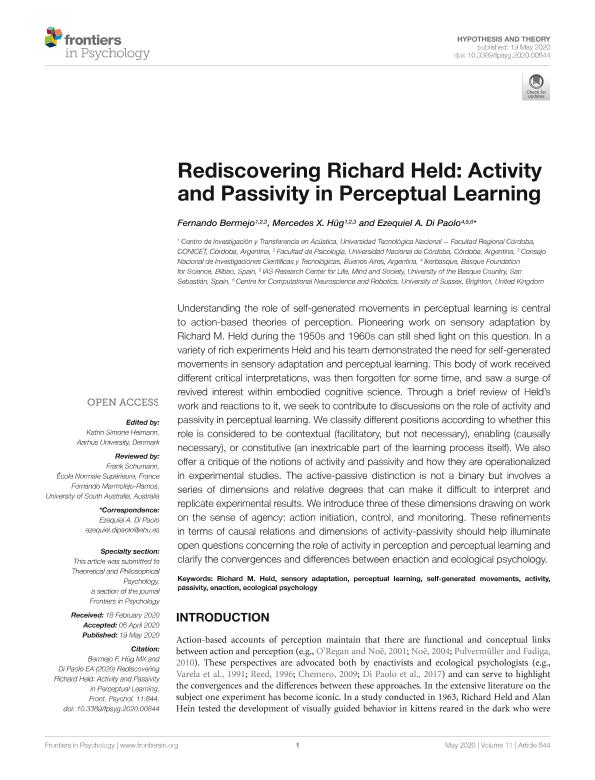Mostrar el registro sencillo del ítem
dc.contributor.author
Bermejo, Fernando Raul

dc.contributor.author
Hug, Mercedes Ximena

dc.contributor.author
Di Paolo, Ezequiel Alejandro

dc.date.available
2021-10-27T05:30:09Z
dc.date.issued
2020-05-19
dc.identifier.citation
Bermejo, Fernando Raul; Hug, Mercedes Ximena; Di Paolo, Ezequiel Alejandro; Rediscovering Richard Held: Activity and Passivity in Perceptual Learning; Frontiers Media; Frontiers in Psychology; 11; 19-5-2020; 1-14
dc.identifier.uri
http://hdl.handle.net/11336/145163
dc.description.abstract
Understanding the role of self-generated movements in perceptual learning is central to action-based theories of perception. Pioneering work on sensory adaptation by Richard M. Held during the 1950s and 1960s can still shed light on this question. In a variety of rich experiments Held and his team demonstrated the need for self-generated movements in sensory adaptation and perceptual learning. This body of work received different critical interpretations, was then forgotten for some time, and saw a surge of revived interest within embodied cognitive science. Through a brief review of Held’s work and reactions to it, we seek to contribute to discussions on the role of activity and passivity in perceptual learning. We classify different positions according to whether this role is considered to be contextual (facilitatory, but not necessary), enabling (causally necessary), or constitutive (an inextricable part of the learning process itself). We also offer a critique of the notions of activity and passivity and how they are operationalized in experimental studies. The active-passive distinction is not a binary but involves a series of dimensions and relative degrees that can make it difficult to interpret and replicate experimental results. We introduce three of these dimensions drawing on work on the sense of agency: action initiation, control, and monitoring. These refinements in terms of causal relations and dimensions of activity-passivity should help illuminate open questions concerning the role of activity in perception and perceptual learning and clarify the convergences and differences between enaction and ecological psychology.
dc.format
application/pdf
dc.language.iso
eng
dc.publisher
Frontiers Media

dc.rights
info:eu-repo/semantics/openAccess
dc.rights.uri
https://creativecommons.org/licenses/by/2.5/ar/
dc.subject
ACTIVITY
dc.subject
ECOLOGICAL PSYCHOLOGY
dc.subject
ENACTION
dc.subject
PASSIVITY
dc.subject
PERCEPTUAL LEARNING
dc.subject
RICHARD M. HELD
dc.subject
SELF-GENERATED MOVEMENTS
dc.subject
SENSORY ADAPTATION
dc.subject.classification
Psicología

dc.subject.classification
Psicología

dc.subject.classification
CIENCIAS SOCIALES

dc.title
Rediscovering Richard Held: Activity and Passivity in Perceptual Learning
dc.type
info:eu-repo/semantics/article
dc.type
info:ar-repo/semantics/artículo
dc.type
info:eu-repo/semantics/publishedVersion
dc.date.updated
2021-10-18T15:46:05Z
dc.identifier.eissn
1664-1078
dc.journal.volume
11
dc.journal.pagination
1-14
dc.journal.pais
Suiza

dc.journal.ciudad
Lausana
dc.description.fil
Fil: Bermejo, Fernando Raul. Consejo Nacional de Investigaciones Científicas y Técnicas. Centro Científico Tecnológico Conicet - Córdoba; Argentina. Universidad Nacional de Córdoba. Facultad de Psicología; Argentina. Universidad Tecnológica Nacional. Facultad Regional Córdoba. Centro de Investigación y Transferencia en Acústica; Argentina
dc.description.fil
Fil: Hug, Mercedes Ximena. Consejo Nacional de Investigaciones Científicas y Técnicas. Centro Científico Tecnológico Conicet - Córdoba; Argentina. Universidad Nacional de Córdoba. Facultad de Psicología; Argentina. Universidad Tecnológica Nacional. Facultad Regional Córdoba. Centro de Investigación y Transferencia en Acústica; Argentina
dc.description.fil
Fil: Di Paolo, Ezequiel Alejandro. Consejo Nacional de Investigaciones Científicas y Técnicas; Argentina. Universidad del País Vasco; España. University of Sussex; Reino Unido. Ikerbasque; España
dc.journal.title
Frontiers in Psychology
dc.relation.alternativeid
info:eu-repo/semantics/altIdentifier/url/https://www.frontiersin.org/article/10.3389/fpsyg.2020.00844/full
dc.relation.alternativeid
info:eu-repo/semantics/altIdentifier/doi/http://dx.doi.org/10.3389/fpsyg.2020.00844
Archivos asociados
